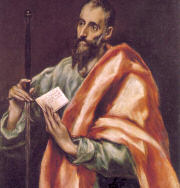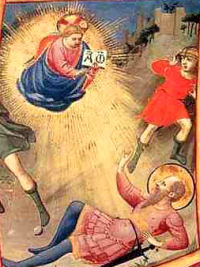The conversion of Saul of Tarsus while he was on his way to Damascus is one of the most touching miracles in the history of the early Church. It shows us how faith comes from grace and from one's free cooperation. The doctrine on the Mystical Body of Christ receives proof and a clear illustration when Christ says, "Saul, Saul, why do you persecute me?" We should realize that the best way to hasten the unity of all Christians is to foster our own daily personal conversion.
Source: Daily Roman Missal, Edited by Rev. James Socías, Midwest Theological Forum, Chicago, Illinois ©2003
Collect:
O God, who taught the whole world
through the preaching of the blessed Apostle Paul,
draw us, we pray, nearer to you
through the example of him whose conversion we celebrate today,
and so make us witnesses to your truth in the world.
Through our Lord Jesus Christ, your Son,
who lives and reigns with you in the unity of the Holy Spirit,
one God, for ever and ever. +Amen.
First Reading: Acts of the Apostles 22:3-16
"I am a Jew, born at Tarsus in Cilicia, but brought up in this city at the feet of Gamali-el, educated according to the strict manner of the law of our fathers, being zealous for God as you all are this day. I persecuted this Way to the death, binding and delivering to prison both men and women, as the high priest and the whole council of elders bear me witness. From them I received letters to the brethren, and I journeyed to Damascus to take those also who were there and bring them in bonds to Jerusalem to be punished.
"As I made my journey and drew near to Damascus, about noon a great light from heaven suddenly shone about me. And I fell to the ground and heard a voice saying to me, 'Saul, Saul, why do you persecute Me?' And I answered, 'Who are you, Lord?' And He said to me, 'I am Jesus of Nazareth whom you are persecuting.' Now those who were with me saw the light but did not hear the voice of the One who was speaking to me. And I said, 'What shall I do, Lord?' And the Lord said to me, 'Rise, and go into Damascus, and there you will be told all that is appointed for you to do.' And when I could not see because of the brightness of that light, I was led by the hand by those who were with me, and came into Damascus.
"And one Ananias, a devout man according to the law, well spoken of by all the Jews who lived there, came to me, and standing by me said to me, 'Brother Saul, receive your sight.' And in that very hour I received my sight and saw him. And he said, 'The God of our fathers appointed you to know His will, to see the Just One and to hear a voice from His mouth; for you will be a witness for Him to all men of what you have seen and heard. And now why do you wait? Rise and be baptized, and wash away your sins, calling on His name.'
Alternative First Reading: Acts of the Apostles 9:1-22
But Saul, still breathing threats and murder against the disciples of the Lord, went to the high priest and asked him for letters to the synagogues at Damascus, so that if he found any belonging to the Way, men or women, he might bring them bound to Jerusalem. Now as he journeyed he approached Damascus, and suddenly a light from heaven flashed about him. And he fell to the ground and heard a voice saying to Him, "Saul, Saul, why do you persecute Me?" And he said, "Who are you, Lord?" And He said, "I am Jesus, whom you are persecuting; but rise and enter the city, and you will be told what you are to do." The men who were traveling with him stood speechless, hearing the voice but seeing no one. Saul arose from the ground; and when his eyes were opened, he could see nothing; so they led him by the hand and brought him into Damascus. And for three days he was without sight, and neither ate nor drank.
Now there was a disciple at Damascus named Ananias. The Lord said to him in a vision, "Ananias." And he said, "Here I am, Lord." And the Lord said to him, "Rise and go to the street called Straight, and inquire in the house of Judas for a man of Tarsus named Saul; for behold, he is praying, and he has seen a man named Ananias come in and lay his hands on him so that he might regain his sight." But Ananias answered, "Lord, I have heard from many about this man, how much evil he has done to thy saints at Jerusalem; and here he has authority from the chief priests to bind all who call upon thy name." But the Lord said to him, "Go, for he is a chosen instrument of Mine to carry My name before the Gentiles and kings and the sons of Israel; for I will show him how much he must suffer for the sake of My name." So Ananias departed and entered the house. And laying his hands on him he said, "Brother Saul, the Lord Jesus who appeared to you on the road by which you came, has sent me that you may regain your sight and be filled with the Holy Spirit." And immediately something like scales fell from his eyes and he regained his sight. Then he rose and was baptized, and took food and was strengthened.
For several days he was with the disciples at Damascus. And in the synagogues immediately he proclaimed Jesus, saying, "He is the Son of God." And all who heard him were amazed, and said, "Is not this the man who made havoc in Jerusalem of those who called on this name? And he has come here for this purpose, to bring them bound before the chief priests." But Saul increased all the more in strength, and confounded the Jews who lived in Damascus by proving that Jesus was the Christ.
Gospel Reading: Mark 16:15-18
He[Jesus] said to them, "Go into all the world and preach the gospel to the whole creation. He who believes and is baptized will be saved; but he who does not believe will be condemned. And these signs will accompany those who believe: in My name they will cast out demons; they will speak in new tongues; they will pick up serpents, and if they drink any deadly thing, it will not hurt them; they will lay their hands on the sick, and they will recover."
Related links on the Vatican Website:
Benedict XVI, General Audience, Saint Peter's Square, Wednesday, October 25, 2006, Paul of Tarsus
Benedict XVI, General Audience, Saint Peter's Square, Wednesday, November 8, 2006, St Paul's new outlook
Benedict XVI, General Audience, Saint Peter's Square, Wednesday, November 15, 2006, St Paul and the Spirit
Benedict XVI, General Audience, Saint Peter's Square, Wednesday, 22 November 2006, St Paul and the Church
Benedict XVI, General Audience, Paul VI Audience Hall, Wednesday, 2 July 2008, Saint Paul (part 1), Religious and Cultural Environment
Benedict XVI, General Audience, Paul VI Audience Hall, Wednesday, 27 August 2008, Saint Paul (2), Life of Saint Paul before and after Damascus.
Benedict XVI, General Audience, Paul VI Audience Hall, Wednesday, 3 September 2008, Saint Paul (3), St Paul's "Conversion".
Benedict XVI, General Audience, Paul VI Audience Hall, Wednesday, 10 September 2008, Saint Paul (4), Saint Paul's Concept of Apostolate.
Benedict XVI, General Audience, St Peter's Square, Wednesday, 24 September 2008, Saint Paul (5), Paul, the Twelve and the pre-Pauline Church.
Benedict XVI, General Audience, Paul VI Audience Hall, Wednesday, 1 October 2008, Saint Paul (6), The "Council" of Jerusalem and the Incident in Antioch.
Benedict XVI, General Audience, St Peter's Square, Wednesday, 8 October 2008, Saint Paul (7), The Relationship with the Historical Jesus.
Benedict XVI, General Audience, St. Peter's Square, Wednesday, 15 October 2008, Saint Paul (8), Paul's Ecclesiological Dimension.
Benedict XVI, General Audience, St. Peter's Square, Wednesday, 22 October 2008, Saint Paul (9), The Importance of Christology: Pre-existence and Incarnation.
Benedict XVI, General Audience, St. Peter's Square, Wednesday, 29 October 2008, Saint Paul (10), The Importance of Christology: the Theology of the Cross.
Benedict XVI, General Audience, St. Peter's Square, Wednesday, 5 November 2008, Saint Paul (11), The Importance of Christology: the Decisiveness of the Resurrection.
Benedict XVI, General Audience, St. Peter's Square, Wednesday, 12 November 2008, Saint Paul (12), Eschatology : the Expectation of the Parusia.
Benedict XVI, General Audience, St. Peter's Square, Wednesday, 19 November 2008, Saint Paul (13), The Doctrine of Justification: from Works to Faith.
Benedict XVI, General Audience, Paul VI Audience Hall, Wednesday, 26 November 2008, Saint Paul (14): The Apostle's Teaching on Faith and Works In Regard to Justification
Benedict XVI, General Audience, Paul VI Audience Hall, Wednesday, Wednesday, 3 December 2008, Saint Paul (15), The Apostle’s teaching on the relation between Adam and Christ
Benedict XVI, General Audience, Paul VI Audience Hall, Wednesday,10 December 2008, Saint Paul (16), Theology of the sacraments
Benedict XVI, General Audience, Paul VI Audience Hall, Wednesday, 7 January 2009, Saint Paul (17), Spiritual Worship
Benedict XVI, General Audience, Paul VI Audience Hall, Wednesday, 14 January 2009, Saint Paul (18), The Theological vision of the Letters to the Colossians and Ephesians
Benedict XVI, General Audience, Paul VI Audience Hall, Wednesday, 28 January 2009, Saint Paul (19), Theological vision of Pastoral Letters
Benedict XVI, General Audience, Paul VI Audience Hall, Wednesday, 4 February 2009, Saint Paul (20), St Paul's martyrdom and heritage






 To complete his schooling, St. Paul was sent to Jerusalem, where he sat at the feet of the learned Gamaliel and was educated in the strict observance of the ancestral Law. Here he also acquired a good knowledge of exegesis and was trained in the practice of disputation. As a convinced and zealous Pharisee, he returned to Tarsus before the public life of Christ opened in Palestine.
To complete his schooling, St. Paul was sent to Jerusalem, where he sat at the feet of the learned Gamaliel and was educated in the strict observance of the ancestral Law. Here he also acquired a good knowledge of exegesis and was trained in the practice of disputation. As a convinced and zealous Pharisee, he returned to Tarsus before the public life of Christ opened in Palestine. 

 Pray for an end to abortion in the United States.
Pray for an end to abortion in the United States. 